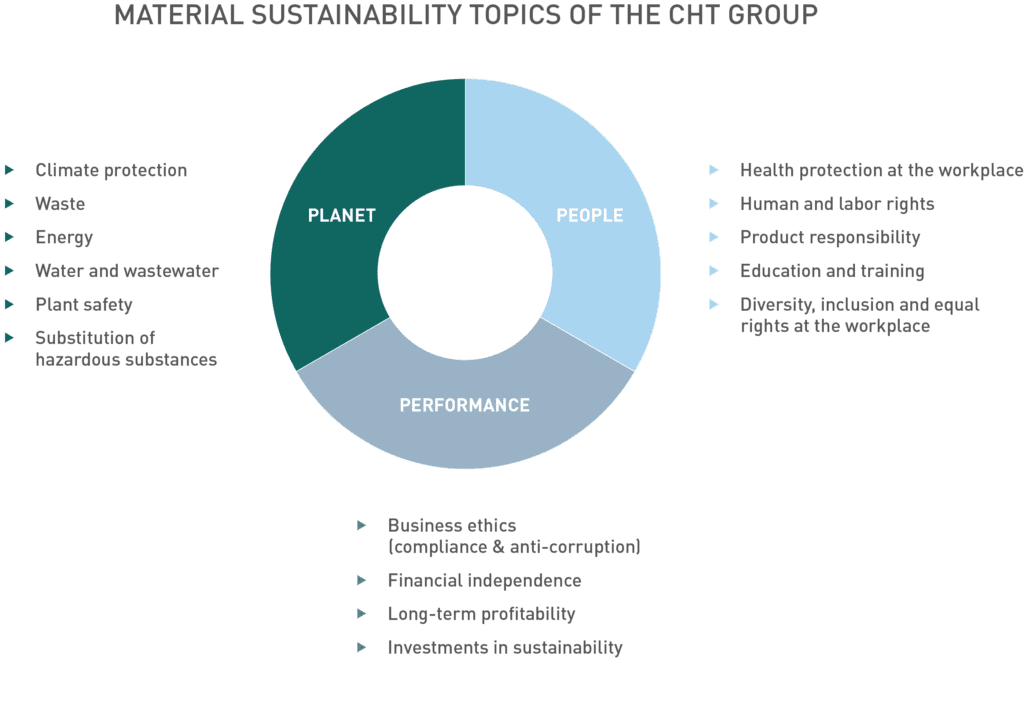SUSTAINABILITY MANAGEMENT
We take responsibility
Long-term business success must create value: for the environment, society, and the economy. That is why sustainability has been a fundamental component of our corporate strategy for many years. We consistently integrate sustainability aspects into our business and into our assessment and management systems. We create added value for the environment and society with products and solutions for our customers. We understand future sustainability trends and derive appropriate measures for our business. We see sustainability as vital to securing our long-term success.
We pursue a holistic approach to sustainability that covers the entire value chain – from our suppliers to our own activities and our customers – based on our 3-P approach “People, Planet and Performance”.
We have set ourselves targets for our actions and underpinned them with measures. In line with our commitment to climate protection and the SBTi initiative, we have committed to becoming greenhouse gas neutral by 2045 and to reducing our absolute greenhouse gas emissions by 42 % (Scope 1+2) and 25 % (Scope 3) by 2030. In addition to energy savings, our reduction plan includes the use of renewable energies and the electrification of the energy generation processes. Moreover, our activities are rounded off by targets for sustainable portfolio management, responsible purchasing, resource-efficient and safe production and diverse and motivated employees.
Our material sustainability topics
Material environmental, social and governance (ESG) topics along our value chain are the focus of our sustainability activities and form the main points of our reporting.
At the beginning of 2024, we updated our materiality analysis from 2020. When identifying and prioritizing the topics, we followed the principle of double materiality for the first time. This approach has been a regulatory requirement since 2024. To identify them, we looked at the topics from the ESRS standard and included all business fields and CHT companies. This enabled us to identify topics that we could potentially have a positive or negative impact on through our business activities along the value chain and that could have a positive or negative effect on our company’s success. To carry out the analysis, we used a standardized Excel tool with uniform assessment criteria and evaluated the relevance of the sustainability topics for various stakeholders. We also incorporated into the assessment the expertise of our employees and external stakeholders, with whom we are in constant contact.
A sustainability aspect is considered material in the sense of double materiality if it describes both the materiality of the impact and the financial materiality. To assess the overall impact, the scale, scope and probability of it occurring and the financial impact on the CHT Group were evaluated.
Identified material sustainability topics

Subsequent to the 2023 reporting, we will review the methodology of our materiality analysis again to ensure that it meets the requirements of the ESRS.
These material sustainability topics play a vital role in our long-term steering processes and reports. We consider the relevance of these topics for our business, the effects along the value chain and the significance for our stakeholders.
We involve stakeholders: open dialog
Our commitment to sustainability is characterized by a trusting and open dialog with our stakeholders. These include the owners of our company, our staff, and external stakeholders such as our customers, suppliers, associations, universities, research institutions and NGOs. In an exchange with them we identify new trends and demands at an early stage, so that we can include them in our development and entrepreneurial decisions.
Stakeholders' needs and expectations of CHT
Employees
- Safe workplace
- Attractive and fair employer
- Development opportunities
- Co-determination
- Trust
- Protection of health
Owners, CHT foundations
- Responsible and sustainable management
- Profitable business expansion
- Risk minimization
Customers
- Innovative and sustainable solutions
- Coverage of human rights risks in the value chain
- Reliability
- Good cost effectiveness
Suppliers
- Fair and reliable business relations
- Support in the implementation of social and ecological demands
Banks
- Long-term planning and performance
- Linking credit conditions to sustainability performance
- Reliability
- Transparent risk management
Society, politics, NGOs, media
- Responsible and credible partner
- Production of safe products in compliance with environmental and social standards
- Jobs and tax payments
We measure value contributions through sustainability
We want to capture the value contribution of our sustainable corporate activities along the entire value chain. We aim to increase our positive contribution to society and minimize the negative effects. To achieve this, we need to better understand the impact of our actions on the environment. This is supported by the experience we have gained in the sustainability assessment of our products. We want to continue to offer our customers innovative products and solutions that support their sustainability goals. Our business units are therefore in close contact with our customers in order to better understand their needs and market requirements and implement them into sustainable CHT solutions.
Our efforts with regard to the sustainable product portfolio are supported by the implementation of the product carbon footprint calculation based on the TfS (Together for Sustainability) method published in 2022.
Valid data collection
All data in this report is recorded and documented in an internally developed reporting system used throughout the group. The reporting system uses a uniform data platform which is available at all CHT sites worldwide. All group-wide data in the areas of ecology and society is collected by locally responsible and access-authorized employees at the various CHT sites. The validity of such data is ensured by a two-stage confirmation process. The tool contains calculation factors, so that all consumptions and emissions can be recorded, calculated, and evaluated centrally.
In addition, CHT has implemented a tool for the group-wide management and assurance of compliance and CSR guidelines. The companies of the CHT Group process a comprehensive compliance survey in the form of a compliance audit or self-assessment. The evaluation is carried out by the Head of Compliance and is summarized and presented to the CHT management for assessment.
Sustainability management
We are continuously working to expand our positive impact on key sustainability issues and reduce the negative impact of our business activities. The Global Sustainability Management, together with decentralized specialist managers, is responsible for integrating sustainability into core business activities and decision-making processes. This unit is also responsible for the global management of climate-related issues. The Global Sustainability Management reports to the CEO.
The systematic assessment of sustainability criteria, including the impact of climate change, is an integral part of acquisition and investment decisions relating to property, plant and equipment. We assess not only economic dimensions, but also potential impacts on areas such as the environment, human rights, and the local community.
We intend to reduce risks in the areas relating to environmental protection, safety, health protection, product responsibility, compliance as well as labor and social standards by globally setting uniform standards. These often go beyond local legal requirements. Across the CHT Group we use internal monitoring systems such as our compliance surveys, which we carry out in the form of compliance audits and self-assessments, to check compliance with these standards. Since January 2024, our whistleblower tool Speakup® has been available worldwide, both internally and externally. Our globally applicable Code of Conduct, which all employees, managers and the Management Board have committed to upholding, defines a binding framework.
